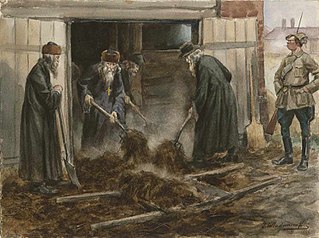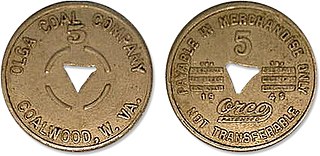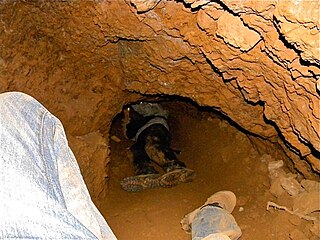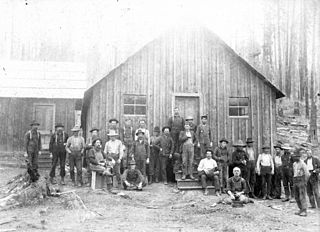
A ghost town, deserted city, extinct town or abandoned city is an abandoned settlement, usually one that contains substantial visible remaining buildings and infrastructure such as roads. A town often becomes a ghost town because the economic activity that supported it has failed or ended for any reason. The town may also have declined because of natural or human-caused disasters such as floods, prolonged droughts, extreme heat or extreme cold, government actions, uncontrolled lawlessness, war, pollution, or nuclear and radiation accidents and incidents. The term can sometimes refer to cities, towns, and neighborhoods that, though still populated, are significantly less so than in past years; for example, those affected by high levels of unemployment and dereliction.

Logging is the process of cutting, processing, and moving trees to a location for transport. It may include skidding, on-site processing, and loading of trees or logs onto trucks or skeleton cars. In forestry, the term logging is sometimes used narrowly to describe the logistics of moving wood from the stump to somewhere outside the forest, usually a sawmill or a lumber yard. In common usage, however, the term may cover a range of forestry or silviculture activities.

Granville County is a county located on the northern border of the U.S. state of North Carolina. As of the 2020 census, the population was 60,992. Its county seat is Oxford. The county has access to Kerr Lake and Falls Lake and is part of the Roanoke, Tar and Neuse River watersheds.

Harlan County is a county located in southeastern Kentucky. As of the 2020 census, the population was 26,831. Its county seat is Harlan. It is classified as a moist county—one in which alcohol sales are prohibited, but containing a "wet" city—in this case Cumberland, where package alcohol sales are allowed. In the city of Harlan, restaurants seating 100+ may serve alcoholic beverages.

Ely is a city in Saint Louis County, Minnesota, United States. The population was 3,268 at the 2020 census.

Butte is a consolidated city-county and the county seat of Silver Bow County, Montana, United States. In 1977, the city and county governments consolidated to form the sole entity of Butte-Silver Bow. The city covers 718 square miles (1,860 km2), and, according to the 2020 census, has a population of 34,494, making it Montana's fifth-largest city. It is served by Bert Mooney Airport with airport code BTM.

Forced labour, or unfree labour, is any work relation, especially in modern or early modern history, in which people are employed against their will with the threat of destitution, detention, violence including death or other forms of extreme hardship to either themselves or members of their families.

A company town is a place where practically all stores and housing are owned by the one company that is also the main employer. Company towns are often planned with a suite of amenities such as stores, houses of worship, schools, markets and recreation facilities.

Penal labour is a term for various kinds of forced labour that prisoners are required to perform, typically manual labour. The work may be light or hard, depending on the context. Forms of sentence involving penal labour have included involuntary servitude, penal servitude, and imprisonment with hard labour. The term may refer to several related scenarios: labour as a form of punishment, the prison system used as a means to secure labour, and labour as providing occupation for convicts. These scenarios can be applied to those imprisoned for political, religious, war, or other reasons as well as to criminal convicts.
A coal town, also known as a coal camp or patch, is a type of company town or mining community established by the employer, a mining company, which imports workers to the site to work the mineral find. The company develops it and provides residences for a population of miners and related workers to reside near the coal mine. The 'town founding' process is not limited to mining, but this type of development typically takes place where mineral wealth is located in a remote or undeveloped area. The company opens the site for exploitation by first, constructing transportation infrastructure to serve it, and later to establish residences for workers. Mineral resources were sometimes found as the result of logging operations that established clear-cut area. Geologists and cartographers could then chart and plot the lands for exploitation.

Convict leasing was a system of forced penal labor that was practiced historically in the Southern United States, the laborers being mainly African-American men; it was ended during the 20th century. It provided prisoner labor to private parties, such as plantation owners and corporations.

Company scrip is scrip issued by a company to pay its employees. It can only be exchanged in company stores owned by the employers. In the United Kingdom, such truck systems have long been formally outlawed under the Truck Acts. In the United States, payment in scrip became illegal in 1938 as part of the Fair Labor Standards Act.

Slavery in Brazil began long before the first Portuguese settlement. Slavery was established in 1516, with members of one tribe enslaving captured members of another. Later, colonists were heavily dependent on indigenous labor during the initial phases of settlement to maintain the subsistence economy, and natives were often captured by expeditions of bandeirantes. The importation of African slaves began midway through the 16th century, but the enslavement of indigenous peoples continued well into the 17th and 18th centuries.

The Coal Creek War was an early 1890s armed labor uprising in the southeastern United States that took place primarily in Anderson County, Tennessee. This labor conflict ignited during 1891 when coal mine owners in the Coal Creek watershed began to remove and replace their company-employed, private coal miners then on the payroll with convict laborers leased out by the Tennessee state prison system.
The Consolidation Coal Company (CCC) was founded in 1875 in Iowa and purchased by the Chicago and North Western Railroad in 1880 in order to secure a local source of coal. The company operated in south central Iowa in Mahaska and Monroe counties until after World War I. Exhaustion of some resources, competition from overseas markets, and other changes led to the company's closing down its mines and leaving its major planned towns by the late 1920s. The CCC worked at Muchakinock in Mahaska County until the coal resources of that area were largely exhausted. In 1900, the company purchased 10,000 acres (40 km2) in southern Mahaska County and northern Monroe County, Iowa.

An artisanal miner or small-scale miner (ASM) is a subsistence miner who is not officially employed by a mining company, but works independently, mining minerals using their own resources, usually by hand.

Papua New Guinea is a source, destination, and transit country for men, women, and children subjected to trafficking in persons, specifically forced prostitution and forced labor. Women and children are subjected to commercial sexual exploitation and involuntary domestic servitude; trafficked men are forced to provide labor in logging and mining camps. Children, especially young girls from tribal areas, are most vulnerable to being pushed into commercial sexual exploitation or forced labor by members of their immediate family or tribe. Families traditionally sell girls into forced marriages to settle their debts, leaving them vulnerable to involuntary domestic servitude, and tribal leaders trade the exploitative labor and service of girls and women for guns and political advantage. Young girls sold into marriage are often forced into domestic servitude for the husband’s extended family. In more urban areas, some children from poorer families are prostituted by their parents or sold to brothels. Migrant women and teenage girls from Malaysia, Thailand, China, and the Philippines are subjected to forced prostitution, and men from China are transported to the country for forced labor.
Human trafficking in Brazil is an ongoing problem. Brazil is a source country for men, women, girls, and boys subjected to human trafficking, specifically forced prostitution within the country and abroad, as well as a source country for men and boys in forced labor within the country. The United States Department of Homeland Security, describes human trafficking as "the use of force, fraud, or coercion to obtain some type of labor or commercial sex act."

A logging camp is a transitory work site used in the logging industry. Before the second half of the 20th century, these camps were the primary place where lumberjacks would live and work to fell trees in a particular area. Many place names are legacies of old logging camps. Camps were often placed next to river tributaries so that the winter's log harvest could be floated to the lumbermills in the spring.















